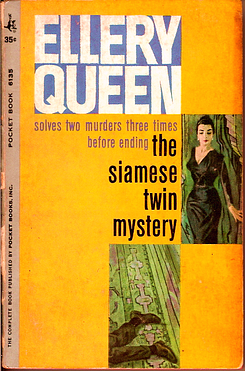Ellery and his father wind up in a forest fire and have to refuge in the Xaviers' mansion. While being hospitable there is a strange tension among the inhabitants and the reason for the other guests' stay only becomes apparent after Dr. John Xavier is found murdered in his study, his right hand grapping a six of spades torn in half.
And that's all anyone that hasn't already read this classic should know. Just as The Greek Coffin Mystery this novel features several twists, but what sets it apart is its setting and plot. The forest fire steadily draws closer and provides a threatening atmosphere that certainly was a clear inspiration for all the neo-orthodox writers and their closed circle settings. I more and more get the Queen-ish approaches by authors like Arisugawa Arisu or Maya Yutaka, but also other classics by Ayukawa Tetsuya. Especially Arisugawa's debut 月光ゲーム and its volcanic eruption and dying message usage are very clear examples.
The dying message, as far as I know, was introduced with The Tragedy of X, which I still haven't read. The Siamese Twin Mystery was published shortly after that and already proposes a different perspective on that theme. The novel features several twists concerning whether a clue has to be interpreted as a dying message by the victim or if it could actually be a deception by the murderer himself. Ellery falls into that trap multiple times, which is a distinct similarity to the multiple false solutions in The Greek Coffin Mystery, where Ellery actually decided to never state his deductions before he is absolutely sure to avaid false accusations, but I guess threatening closed circles and weird clues demand drastic measures, Furthermore the whole case, as turns out in the end, could have never worked out this way for the murderer outside of a closed circle.
I know, I didn't want to tell too much, but anyway, stuff happens and the misdirections are so subtle and clever that I didn't spot the final and essential bit that would have made me look right through the whole card thing to see what's actually most important. The essential aspect of the deduction chain it a bit less logical and more intuitional than one would expect in a Queen novel, but it definitely was hinted at in a subtle yet fair way (still, the fact that no challenge to the reader was included this time speaks for itself I guess*).
By now I realized these kind of Queen-ish puzzles can be just as entertaining and baffling when done right as complex Carr-ish locked room mysteries can be. The crime scenes and clues are kind of minimalistic in comparison, but that's exactly why the deduction process, the solution and the logic behind everything is so surprising and safisfying eventually. On the other hand, complex and fascinating locked rooms can really disappoint you if the solution is not just as complex and fascinating as well in the end. Of course there are simple yet brilliant tricks that are able to cope with the murder scenario, but they might work better in a short story than a full-fledged novel you invested your time in and want to be compensated sufficiently.
Anyway, another Queen novel I really liked. Now on to some other nationality title... The Drury Lane omnibus is too hefty considering the amount of free time I should be able to grant myself at the moment. Too much on my mind and too much to do if I was honest and not procrastinating...
* In 探偵小説と二〇世紀精神 Kasai Kiyoshi theorizes about why Siamese is the only novel among the nationality titles which does not include a challenge to the reader, plus he also discusses topics like the author's and his clues' arbitrariness and therefore the unique kind of logic inherent in orthodox detective novels, but I won't touch on any of that here since for that, just like Kasai, I would have to mercilessly spoil both Siamese and Greek.
* In 探偵小説と二〇世紀精神 Kasai Kiyoshi theorizes about why Siamese is the only novel among the nationality titles which does not include a challenge to the reader, plus he also discusses topics like the author's and his clues' arbitrariness and therefore the unique kind of logic inherent in orthodox detective novels, but I won't touch on any of that here since for that, just like Kasai, I would have to mercilessly spoil both Siamese and Greek.

I loved Kasai's detailed reading of the Queen novels (amongst others) in 探偵小説と二〇世紀精神 and I really wish there were more of these formalistic readings of detective fiction, instead of the same-old historical overviews.
ReplyDeleteThe dying message in The Tragedy of X is not nearly as satisfying as the one in Siamese Twin, with the latter being a lote more detailed and more intertwined with the whole structure of the book. Queen has a whole series of dying message stories (a lot of them short stories) and they are usually quite interesting to read (although sometimes too ingenous).
And I've always loved Queen's logic. It's just so satisfying when he explains his deductions literally step by step, just to show how there could only be one truth. French Powder and The Tragedy of Z have some great scenes.
I also enjoy reading these formalistic theories on detective fiction a lot, but try implementing them in your own research in the context of Japanese studies, when you actually want it to be recognized sufficiently to let's say... study overseas *cough*
ReplyDeleteWhen I opened my university mail client today, I realized again I shouldn't read anything during semester break... but in case I ignore that fact, I guess it will be French, Egypt or Chinese.